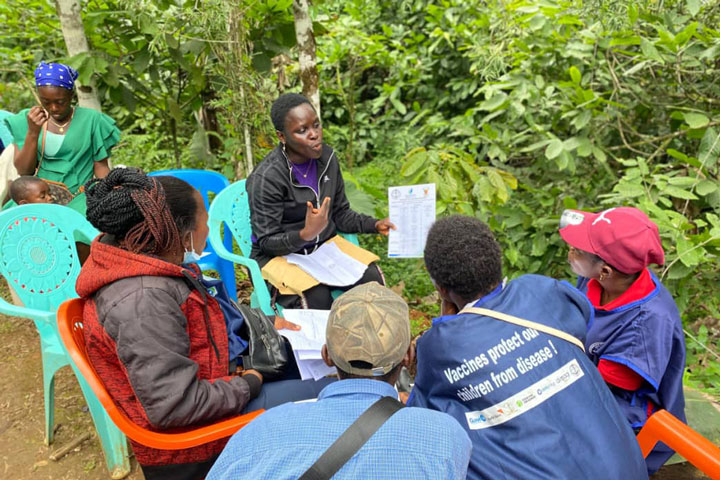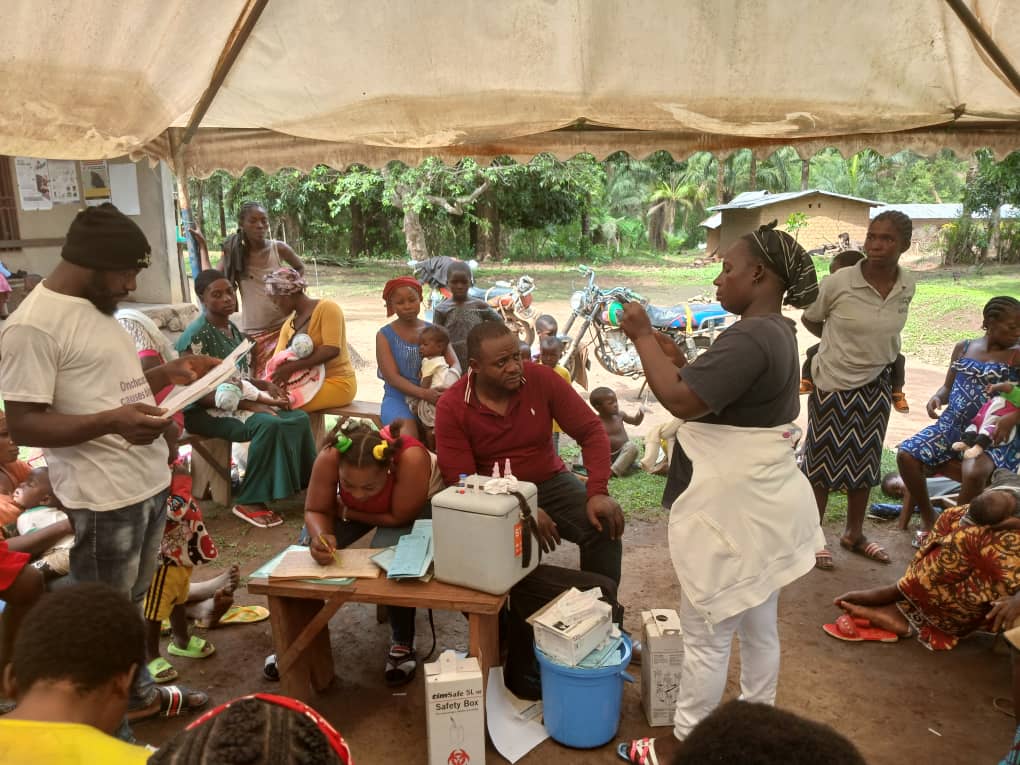How a Gavi-supported project is changing lives in conflict-affected Cameroon
In Cameroon’s Northwest and Southwest regions, years of conflict have resulted in perilously low immunisation rates. A project led by the Cameroon Baptist Convention Health Services is changing that.
- 10 June 2025
- 5 min read
- by Lylie Sekpon , Eugene Foyeth , Delphine Fri Chifor

In the war-torn Northwest and Southwest regions of Cameroon, conflict has devastated health systems, leaving an estimated 40% of health facilities non-functional, and forcing medical personnel to flee for safety.1 The humanitarian crisis has led to a 60% drop in routine immunisation rates in affected areas2, leaving coverage rates at below 30% in some areas3, and exposing thousands of children to preventable, deadly diseases including measles and polio.
ZIP Cameroon isn’t just an emergency programme – it’s a blueprint for long-term health resilience.
“In these regions, mistrust of government-led healthcare is deep-rooted, exacerbated by years of conflict,” explains Dr Eugene Foyeth, who oversees operations in conflict-affected zones for the Cameroon Baptist Convention Health Services (CBCHS). “Many families refuse vaccination not out of disregard, but due to fear and misinformation.”
In other words, a second-order health crisis is brewing that demands urgent resolution. Since February 2025, when Gavi awarded CBCHS a package of funding under its Zero-dose Immunization Programme (ZIP) humanitarian partnerships initiative, the healthcare NGO has been working towards one, helping bridge immunisation gaps in conflict-affected region, and get vulnerable unimmunised children protected.
People in conflict zones need a different kind of help
Since its inception in 2022, the ZIP humanitarian partnerships programme has operated in multiple crisis settings, negotiating access to vaccination and other healthcare interventions for conflict- and disaster-affected communities across 11 countries in Africa. More than 1.6 million unvaccinated children aged between zero to five years of age have been protected under its aegis, with 14.8 million doses of vaccines administered.

The Cameroon programme is Gavi’s newest humanitarian immunisation grant, joining a portfolio of awards designed to reach missed-out communities, in accordance with Gavi’s commitment to vaccination equity.
The CBCHS-led work in Cameroon comes at a crucial moment. With ongoing violence and displacement disrupting healthcare services, the programme deploys mobile vaccination teams trained in community-based tracking and outreach. Their mission? To make sure that children aged zero to five, who have been cut off from healthcare due to instability, receive their scheduled vaccinations, whether through routine or catch-up interventions, and despite the logistical and security challenges that may stand in the way.
3,000 kids newly protected
For many families, ZIP has delivered the first opportunity they’ve had in years to vaccinate their children without fear or hardship. Odila, a grandmother caring for four young children, recalled harbouring misgivings about vaccination, grounded in mistrust of the government. Her perspective has shifted since the CBCHS teams have engaged her community, dispelling myths and restoring confidence. “I was really impressed,” she says. “My children are now protected. I am very happy.”
Odila’s grandchildren number among thousands of children in Cameroon who have been vaccinated only because of CBCHS’s work in the region. In fact, in just two months, ZIP Cameroon has reached over 3,000 children with their very first vaccine dose.
To achieve that milestone, the project has engaged 151 traditional leaders, 108 religious figures, and 257 key community influencers, ensuring immunisation efforts are embraced at every level.
“We are witnessing a dramatic shift in attitudes toward vaccination,” says Humphrey, a health worker in Bamenda. “Before ZIP, vaccination was complicated. People didn’t trust it. Now, acceptance is growing. Families see the benefits, and mothers are saving money because vaccines are accessible.”
CBCHS teams ensure children receive all required doses through door-to-door outreach and community-based tracking, reinforcing trust in health services. And beyond the vaccines that are the programme’s principal focus, ZIP Cameroon brings other services, including nutritional screenings, maternal and child health support, and gender-based violence prevention, into marginalised communities.
Getting context-specific
ZIP Cameroon builds on Raise for Sahel (R4S), a ZIP-led project that ran from 2023 to 2024, and demonstrated conclusively that vaccinating in previously missed-out and highly complex conflict zones was a feasible endeavour.
R4S successfully administered 37,732 first doses of pentavalent vaccine and 21,653 last doses of vaccines (MCV2 and pentavalent 3), proving that targeted efforts can overcome even the trickiest barriers to immunisation. “The lessons learned from R4S gave us confidence,” explains Dr Foyeth, CBCHS project manager. “We refined our approach – focusing on access negotiation, data-driven tracking and integrating humanitarian services – to make ZIP Cameroon even more effective.”

But if R4S offered clues as to what worked, it wasn’t a perfect model – in fact, one of its key lessons was that the best solutions are highly-context specific. The Gavi humanitarian partnerships are a flexible framework, so that teams like CBCHS can develop real-time solutions that fit the conditions they’re working in – and which they understand best. “Gavi allows us to tailor our approach,” explains Dr Foyeth. “They support our human resources structure, enabling deeper community engagement and humanitarian access negotiations.”
Overcoming challenges and building resilience
Operating in conflict zones means dealing with moving, changing sets of obstacles. In order to be as adaptable as possible, ZIP Cameroon uses real-time data monitoring and maintains flexible vaccination strategies – for instance, redirecting teams when fighting escalates, and renegotiating access with local leaders. CBCHS also tackles population displacement, deploying local influencers and town criers to broadcast vaccination schedules, ensuring continuity in care.
Have you read?
By integrating routine immunisation with humanitarian aid, CBCHS is strengthening health systems and rebuilding trust in medical services. ZIP Cameroon isn’t just an emergency programme – it’s a blueprint for long-term health resilience.
“We are proving that even in fragile contexts, health interventions can succeed,” says Delphine Fri, Social and Behavioral Changes Officer at CBCHS. “The key is trust, consistency, and making communities feel included in the process.”
1 Cameroun: rapport de situation, 26 Octobre 2023. Yaoundé: UNOCHA, 2023 & La crise sociopolitique dans les regions du Nord – Ouest et du Sud – Ouest du Cameroun : évaluation de l’impact économique et social> Banque Mondiale, 2021
2 La crise sociopolitique dans les regions du Nord – Ouest et du Sud – Ouest du Cameroun : évaluation de l’impact économique et social> Banque Mondiale, 2021
3 La crise sociopolitique dans les regions du Nord – Ouest et du Sud – Ouest du Cameroun : évaluation de l’impact économique et social> Banque Mondiale, 2021





